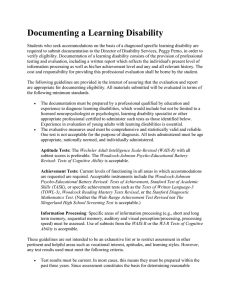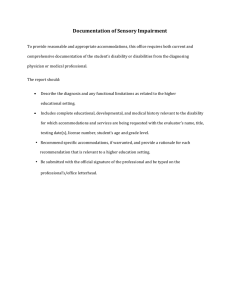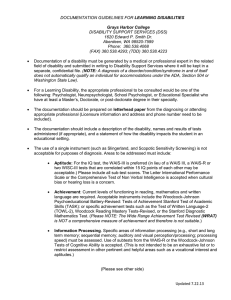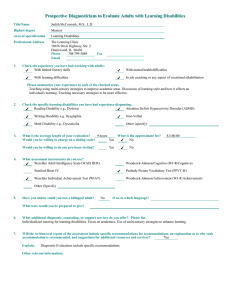Documenting a Learning Disability
advertisement
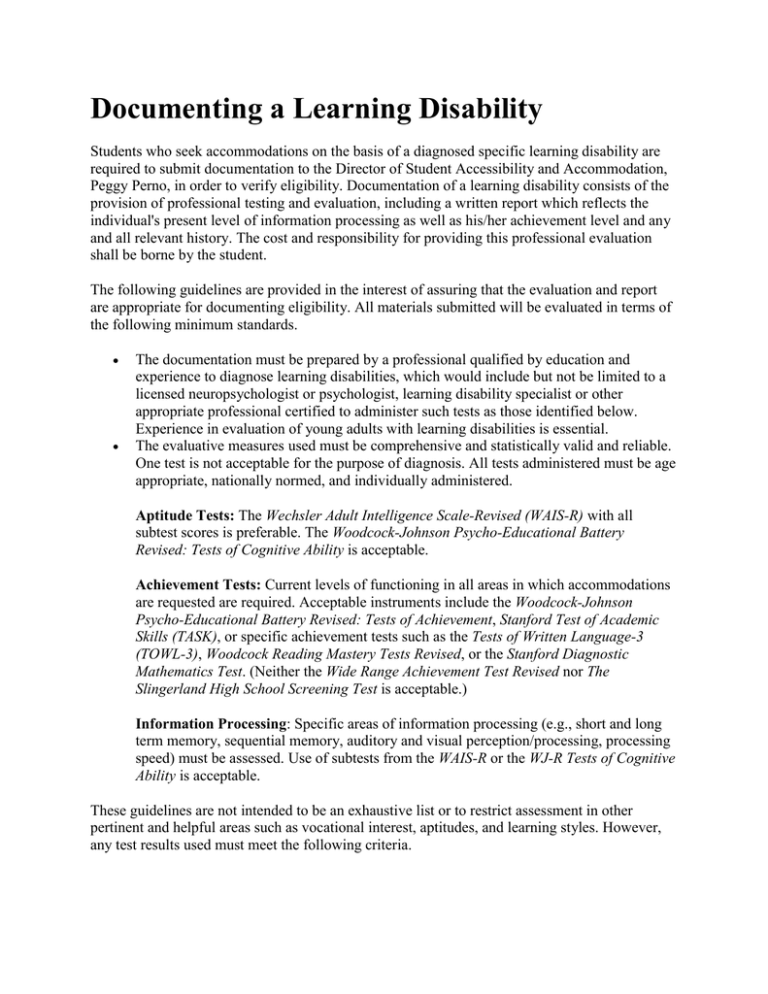
Documenting a Learning Disability Students who seek accommodations on the basis of a diagnosed specific learning disability are required to submit documentation to the Director of Student Accessibility and Accommodation, Peggy Perno, in order to verify eligibility. Documentation of a learning disability consists of the provision of professional testing and evaluation, including a written report which reflects the individual's present level of information processing as well as his/her achievement level and any and all relevant history. The cost and responsibility for providing this professional evaluation shall be borne by the student. The following guidelines are provided in the interest of assuring that the evaluation and report are appropriate for documenting eligibility. All materials submitted will be evaluated in terms of the following minimum standards. The documentation must be prepared by a professional qualified by education and experience to diagnose learning disabilities, which would include but not be limited to a licensed neuropsychologist or psychologist, learning disability specialist or other appropriate professional certified to administer such tests as those identified below. Experience in evaluation of young adults with learning disabilities is essential. The evaluative measures used must be comprehensive and statistically valid and reliable. One test is not acceptable for the purpose of diagnosis. All tests administered must be age appropriate, nationally normed, and individually administered. Aptitude Tests: The Wechsler Adult Intelligence Scale-Revised (WAIS-R) with all subtest scores is preferable. The Woodcock-Johnson Psycho-Educational Battery Revised: Tests of Cognitive Ability is acceptable. Achievement Tests: Current levels of functioning in all areas in which accommodations are requested are required. Acceptable instruments include the Woodcock-Johnson Psycho-Educational Battery Revised: Tests of Achievement, Stanford Test of Academic Skills (TASK), or specific achievement tests such as the Tests of Written Language-3 (TOWL-3), Woodcock Reading Mastery Tests Revised, or the Stanford Diagnostic Mathematics Test. (Neither the Wide Range Achievement Test Revised nor The Slingerland High School Screening Test is acceptable.) Information Processing: Specific areas of information processing (e.g., short and long term memory, sequential memory, auditory and visual perception/processing, processing speed) must be assessed. Use of subtests from the WAIS-R or the WJ-R Tests of Cognitive Ability is acceptable. These guidelines are not intended to be an exhaustive list or to restrict assessment in other pertinent and helpful areas such as vocational interest, aptitudes, and learning styles. However, any test results used must meet the following criteria. Test results must be current. In most cases, this means they must be prepared within the past three years. Since assessment constitutes the basis for determining reasonable accommodations, it is in a student's best interest to provide recent and appropriate documentation to serve as the basis for decision-making about a student's needs for accommodations in an academically competitive environment. Retesting may not be required if a qualified medical professional determines it is not medically necessary. The results and interpretation must present clear and specific evidence which identifies and states specific learning disabilities. The identification of learning styles or learning differences do not, in and of themselves, specify a learning disability. The diagnostician must provide a list of academic accommodations with supporting data from the testing which is specific to the individual assessed. Recommendations which are not supported by documentation may be refused. Documentation should be sent to: Student Accessibility and Accommodation University of Puget Sound 1500 North Warner Tacoma, WA 98416-1096 Fax: 253-879-3786 Email: saa@pugetsound.edu
